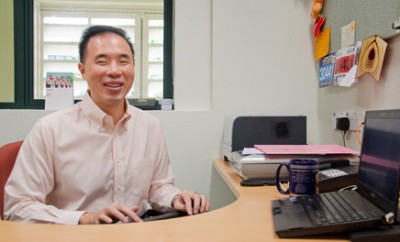Young Children’s Voices in Mathematical Problem Solving
Contributed by Dr Ho Siew Yin and Sng Wei Qin Abbie, from NTUC First Campus, for SingTeach Virtual […]
Read More
Special education is something close to Dr Wong Meng Ee’s heart. Being visually impaired, he understands the challenges that students with special needs face and wants to improve their schooling experiences through his research.
He holds a doctorate from a prestigious university. He enjoys taking part in sporting events, and has even represented Singapore in the Commonwealth Games.

These are no mean feats for anyone, and Meng Ee achieved them despite being visually impaired.
But as a student, he struggled with his studies. This was because educational services for special needs students were limited in the past.
Meng Ee not only understands what students with special needs go through. He knows first-hand what they really need.
“When I was in school, I was left to my own devices,” he recalls of his experience in a mainstream school. “The concept of inclusion was foreign to them. I was not well supported, and I did badly.”
The turning point came when he left for the UK, where he enrolled in a school for the blind. “I had a wonderful time! The teachers understood me and helped me gain the confidence to have some level of independence.”
With the increased support and new-found confidence, Meng Ee continued to flourish and went on to graduate from the University of Cambridge with a PhD in Sociology.
Meng Ee now focuses much of his research on special education (SPED). He wants to give special needs students the opportunity to succeed in school and in life.
“It was challenging for me,” he said of his own schooling experiences, “and so I hope my research can help make our education beneficial to those who are also struggling.”
One of his research projects looks at the evolving identities of Allied Educators (AEDs) and their role in supporting students with special needs.
Together with Sirene Lim, Libby Cohen and Denise Tan, Meng Ee interviewed a batch of AEDs who were fresh out of training and found them to be enthusiastic about the purpose of their work. A year later, they caught up with them again to see how they were doing in schools.
In a classroom context, it‘s difficult for the teacher to identify and meet the needs of every student, especially those with special needs. Meng Ee found that that’s usually where the AEDs come in.
– Wong Meng Ee, Early Childhood and Special Needs Education Academic Group
Like the saying goes, two heads are better than one. Just as teachers are content experts in their subjects, AEDs are the experts when it comes to special needs. They may be able to bring a differentiated approach to the teaching, for example, or even teach parts of the lesson.
“AEDs may not do the teaching of the curriculum, but with their training in SPED, they can assist the teacher in specific areas,” explains Meng Ee.
But being the only “expert” in special needs in a school sometimes translates into greater expectations and responsibilities for the AED. They may even be seen as “miracle workers”.
But Meng Ee stresses that supporting students with special needs is a shared responsibility. Schools can do more to enhance the collaboration between teachers and AEDs.
“The continuous working relationships between the AEDs and teachers can make that difference for the students,” he notes. “It will take a lot of planning and work, but it will benefit students at the end.”